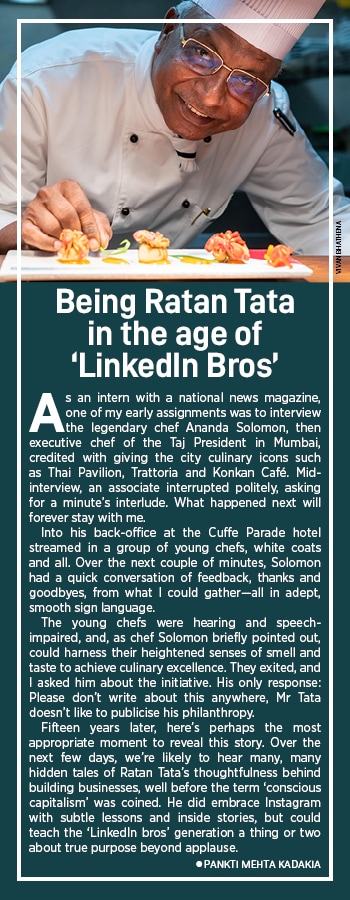 Ratan Tata carried this philanthropic legacy forward from his ancestors
Ratan Tata carried this philanthropic legacy forward from his ancestors
Image: Pradeep Gaur/Mint via Getty Images
Through the course of his lifetime, Ratan Naval Tata showed how businesses can—and should—move beyond the pursuit of profits.
In keeping with the legacy of his predecessors, the former chairperson of the Tata group not only steered billions of dollars towards lasting social impact, but also espoused a philanthropic philosophy centred on making a difference.
Among the multitude of posts on social media following the death of Tata on Wednesday night are stories of the love and compassion he had towards stray animals. While the doors of the Tata House and Taj Hotel in Mumbai have always been a refuge to stray dogs, one of Tata’s last personal projects, at the age of 86, was to open India’s first Small Animal Hospital in Mumbai in 2023. The facility, which is state-of-the-art and spread across 98,000 square feet, was built to meet a range of health care treatments that pets and stray dogs might need.
Natarajan Chandrasekaran, the current chairman of Tata Sons—the principal investment holding company for Tata Group—described Tata in a press release announcing his death as someone who “inspired by example” and helped the group expand its global footprint while remaining dedicated to philanthropy and societal development.
Tata carried this philanthropic legacy forward from his ancestors. His great-grandfather Jamsedji Tata, founder of the Tata group, was the world’s biggest philanthropist of the last century. The 2021 EdelGive Hurun Philanthropists of the Century list pegged the value of his donation, mainly towards education and health care, at $102.billion, with the start of his main endowments in 1892. Jamsedji Tata was the only Indian in the top 10 list, which also included Bill Gates and Melinda French Gates, Henry Wellcome, Warren Buffet and Howard Hughes.
The report also mentions how, in the wake of the Covid-19 pandemic, the Tata Trusts, then under the leadership of Ratan N Tata, donated as much as $270 million towards relief efforts.
Tata took over from JRD Tata as chairman of Tata Sons and Tata Trusts in March 1991. On becoming chairperson of Tata Trusts, he evolved its focus from charitable work to sustainable impact programmes for communities that sought to transform their lives, says Pritha Venkatachalam, partner and co-head, Asia and Africa at the global non-profit organisation, The Bridgespan Group.
“Ratan Tata being awarded the 2024 Goalkeepers Champion award last month is a timely testimony to everything that the Trusts and he have achieved over recent years,” she says. “When I met him a few months back, he spoke passionately about ‘their unfinished business of ending malnutrition in India and transforming cancer care for one and all’, underlining his unwavering commitment to creating a world free of hunger.”
Also read: Ratan Naval Tata: Legend Through The Years
Venkatachalam adds that under his leadership, Tata Trusts adopted a holistic, intersectional and systemic approach to issues that they collaborate on, including education, nutrition, rural livelihoods, WASH (water, sanitation and hygiene), skilling, arts and sports, and environmental sustainability. “For example, the Internet Saathi and Lakhpati Kisan are bold philanthropic initiatives with lasting impact for women and farmer communities. The legacy of inclusive development led by the Trusts have advanced India’s progress across sustainable development goals (SDG),” she says.
 Tata had an estimated net worth of Rs3,800 crore, as per the IIFL Wealth Hurun India Rich List 2022, and ranked 421. He was often conspicuous in his absence among the various lists on India’s richest businesspersons, including Forbes India’s ‘India’s 100 Richest’ list, which are calculated on an individual’s net worth. This is because his wealth, because of the structure of the Tata group, was tied to the charitable organisation Tata Trusts. About 66 percent of the equity of Tata Sons is held by the Tata Trusts, and dividends flow directly to support the philanthropic work of the Trusts.
Tata had an estimated net worth of Rs3,800 crore, as per the IIFL Wealth Hurun India Rich List 2022, and ranked 421. He was often conspicuous in his absence among the various lists on India’s richest businesspersons, including Forbes India’s ‘India’s 100 Richest’ list, which are calculated on an individual’s net worth. This is because his wealth, because of the structure of the Tata group, was tied to the charitable organisation Tata Trusts. About 66 percent of the equity of Tata Sons is held by the Tata Trusts, and dividends flow directly to support the philanthropic work of the Trusts.
“While we celebrate all that we have achieved as a nation, our commitment remains to those who continue to be affected by rising inequality, the unprecedented physical impacts of climate change, and those whose social status deepens their experiences of deprivation and scarcity,” he said in his note as the chairman of the Tata Trusts, in their annual report 2022-23.
The Tata Trusts ranks fifth among the 20 largest philanthropic funders in Asia. As per a preview of a report by The Bridgespan Group to be published in October, titled High-Impact Philanthropy: Giving Better Across Asia and the World, the average annual philanthropic giving of the Tata Trusts between 2018 and 2022 is $168 million.
“His philanthropic approach was rooted in compassion and humility, matched with bold ambition to help the less fortunate at scale. He believed in collaborating with a range of actors, including academic/ research institutions, non-profits, philanthropic or CSR foundations, businesses and government, to accomplish lofty impact goals,” Venkatachalam says.
She recalls that in an interview with Bridgespan as part of their India Remarkable Givers series a few years ago, Tata had emphasised that it was important to him that his philanthropic giving makes a difference. He said, “If you cannot make a difference, it’s just water trickling through a tap or leaking through a drainage system; it’s wasteful.”
